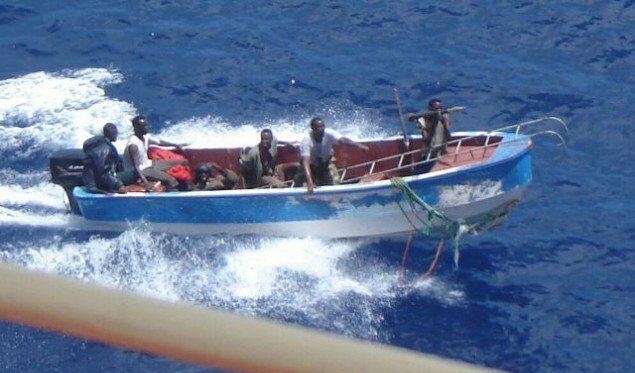Admiral urges shipowners to comply with piracy recommendations as Somali threat resurfaces

A Combined Maritime Force (CMF) visit to Dubai has given the regional counter-piracy coordinator an opportunity to discuss security issues with global maritime industry representatives.
Rear Admiral Tatsuya Fukuda JMSDF, Commander of Combined Task Force 151 (CTF151), paid a visit to the Dubai-based UK Maritime Trade Operations (UKMTO) and conducted discussions with the officer in charge, Lieutenant Commander Iain Beaton RN, and his team. The admiral also attended the bi-annual Maritime Information Exchange Vessel Operators Meeting (MIEVOM), an opportunity for merchant vessel owners to discuss ways to collaborate more closely with military naval officers from the international task forces working to maintain safe seas and pirate-free waters off Somalia.
The MIEVOM programme enabled the speakers to remind all parties that countering piracy is a collaborative effort between industry, militaries and wider regional security partners. During the presentations, merchant vessel owners, masters and insurers were all encouraged to ensure maintenance of Best Management Practice version 4 (BMP4) for vessels transiting the region. These basic guidelines, if all ships complied, would improve the effectiveness of counter piracy efforts in the area.
One of these guidelines ensures that ships are not alone. During his visit, RADM Fukuda was told that, by reporting to the UKMTO in Dubai, shipowners can have their vessels monitored throughout their transit of the High Risk Area. Advised to also register their transit with the Maritime Security Centre, Horn of Africa (MSCHOA), masters are able to discuss any specific risks associated with their vessel and its planned route.
Speaking at MIEVOM, Lieutenant Commander Beaton reminded delegates that the threat of pirate activity highlighted “the importance of a citadel and registration of vessels with MSCHOA and UKMTO.”
Shipmasters and owners were strongly advised to continue using the Internationally Recommended Transit Corridor (IRTC) across the Gulf of Aden. The wisdom of this advice had recently been clearly demonstrated with the successful outcome of a piracy attack within the IRTC. It has been seen that within minutes of any master’s report that the vessel is under attack, naval air assets can be on the scene in order to assist.
The MIEVOM meeting delegates were reminded that several of the recent attacks on vessels have been on vulnerable ships, whether because of their location or speed or the lack of ship protection measures. The speakers reiterated the importance of deterrents, such as razor wire, along with extra protection for the bridge. Robert Buckham, representing Gulf Energy Maritime, said: “If pirates are unable to board a ship, they can’t hijack it.”
Upon conclusion of a programme in the UAE, RADM Fukuda commented: “Compliance with the recommendations is the industry’s contribution to the shared effort to deter and defeat pirates.”

Mostly quasi-incidents.